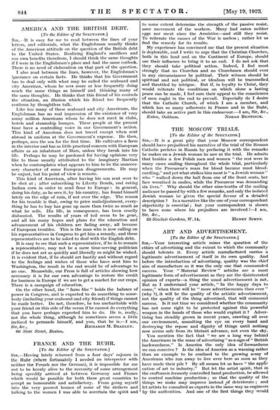AMERICA AND THE BRITISH DEBT. [To the Editor of the
SPECTATOR.] SIR,--R is easy for me to read between the lines of your letters, and editorials, what the Englishman usually thinks of the American attitude on the question of the British debt to the United States. Realizing England's sacrifices and our own benefits therefrom, I should think the same thoughts if I were in the Englishman's place and had the same outlook. There is no need of elaboration on that part of the question.
I also read between the lines, however, the Englishman's ignorance on certain facts. He thinks that his Government has to deal only with what may be called the seaboard and city American, whom he sees more or less frequently doing much the same things as himselt and thinking many of the same thoughts. He thinks that this friend of his controls the situation, an illusion which his friend too frequently confirms by thoughtless talk.
Like too many of these seaboard and city Americans, the Englishman has no real impression of the existence of very many million Americans whom he does not meet in clubs, hotels and steamship lounges. These people at the present time have a controlling voice in our Government's action. This kind of American does not travel except when sent abroad in uniform at the Government's expense. He then, perhaps, sees the sea for the first time. He cultivates a farm in the interior and has as little practical concern with European affairs as an inhabitant of Mars, unless they break into his life. Perhaps he may be pardoned for having opinions very like to those usually attributed to the imaginary Martian when he contemplates what appears to him to be the unneces- sary character of some European disagreements. He may be unjust, but his point of view is remote.
This kind of American, after having his son sent over to be shot at ; after subscribing to Liberty Bonds, and eating Indian corn in order to send flour to Europe : in general, doing his duty, as he sees it, by his country, has found himself lately on the edge of ruin, if not over the edge. The reason for his trouble is that, owing to price maladjustment, every- thing he has to buy has gone up more than twice as much as what he sells. His life, in consequence, has been cruelly dislocated. The results of years of toil seem to be gone, and all his many hopes and plans for the education and advancement of his children are fading away, all because of European troubles. This is the man who is now calling on his representatives in Congress to get him a remedy, and these representatives are to be asked to deal with the English debt.
It is easy to see that such a representative, if he is to remain a representative, may not be a mere time-serving politician if he does not act as quickly and liberally as might be wished. It is evident that, if he should act hastily and without regard to the feelings and wishes of those who have sent him to Washington, the result in the end would be of advantage to no one. Meanwhile, our Press is full of articles showing how necessary it is for our own advantage to restore the credit for business in Europe if we are to get a market for our crops. There is a campaign of education.
On the other hand, the " farm bloc " holds the balance of power in Congress, and is expected to do something to some- body (including your seaboard and city friend) if things cannot be made better. Do not, therefore, be too uncharitable with your friend on this side of the ocean if he cannot do everything that you have perhaps expected him to do. He is, really, not the whole thing, although he sometimes seems a little inclined to persuade himself, and you, that he is.—I am,










































 Previous page
Previous page